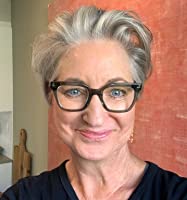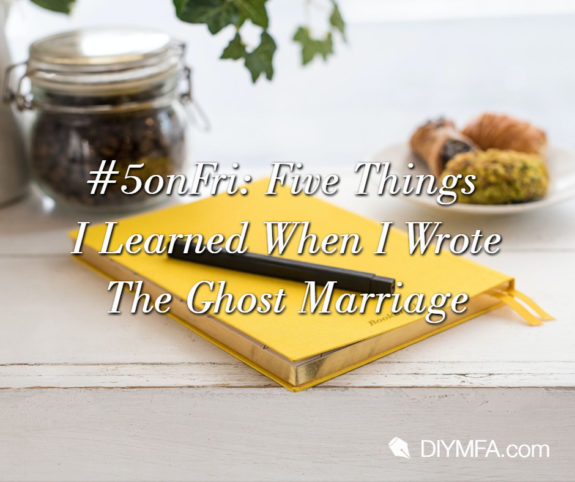My memoir, The Ghost Marriage, wasn’t a book I planned to write. I had been working on short stories and a historical novel; it never occurred to me that anything in my own life would be interesting enough to write about. Then the bottom dropped out of my marriage, I went through a difficult divorce, and my ex-husband died soon thereafter. That’s when things started to get really interesting, including psychics, ghostly appearances, and other unexplained phenomena. A chorus of friends and others convinced me that this was the book I was meant to write. As a result, I learned a lot about the writing of memoir on the fly. Here are some of the key lessons I came away with.
1. Be clear on why you’re writing it.
People write memoirs for many different reasons: therapy, vindication, revenge, or merely to tell a good story. Before beginning to write, ask yourself what you hope to accomplish. As I’ve said, I had no intention of writing this memoir, particularly because it delved into a painful chapter of my life, but others convinced me that the story was critical to my own development and that sharing it might help others.
Now I personally believe that the publication of this book was part of a spiritual agreement between my ex-husband and myself, that it was something I was destined to do. The paranormal aspects of the story definitely make me vulnerable to skepticism—possibly even ridicule.
That’s another thing about memoir: when it’s published, people will not only judge your book, but it will feel like they’re judging your life and behavior as well.
2. Real life can be as subjective as fiction.
When you write a memoir, your major source of information is yourself: your memory, your perspective, your version of events. Mary Karr, known as “the boss of memoir,” provides a helpful checklist, which includes the advice to “Collude with the reader about your relationship with the truth and memory.” This can often be achieved with a perspective of reflection from the future, when you might feel differently than you did in the moment, or when you see the error of your previous thinking.
In The Ghost Marriage, I used phrases like “Was it ignorance or fear that prevented me from asking deeper questions, demanding more details?” and “If I’d been older, or wiser, or had children of my own, I might have pointed out…” to show that I, the writer, didn’t necessarily condone my own past behavior.
3. Just because you have a voice doesn’t mean it works on the page.
Voice is critical to memoir. It’s such a personal genre, readers need to love your voice in order to keep reading. However, our spoken voice isn’t necessarily our written voice. I recently read a memoir by someone I’ve met. In real life, she’s funny and brazen and sarcastic. But on the page she was wordy and grammatically correct and, well, lawyerly (she’s a lawyer). She was so used to writing briefs, crossing every T and dotting every I, that she couldn’t relax on the page.
There are so many memoirists whose voices I do love: Elizabeth Gilbert, Cheryl Strayed, Glennon Doyle, Mary Karr, to name a few. Their humor and personality are all the more admirable because I know how hard it is to convey that on the page.
4. Your characters are real people who will be affected.
They say to write a memoir as if no one will read it, so you can be as honest and outrageous as possible in your first draft. But the closer you get to publication, the more you need to think about the real people you might be implicating in your story. In my case, I was blessed in that my antagonist—my ex-husband—had died. I could say what I wanted about him. But my children, my step-daughters, and my friends were all still very much alive. For that reason, I changed everyone’s names and left out certain events that I thought would be just too painful for them to read about. The two names I didn’t change were my ex-husband’s and my married name (I’ve since returned to my maiden name).
When I finally told my children about the book, when I was very close to publication, my son asked if I was still using the family surname. That was their legacy, he said, and an important final layer of privacy. I have to admit that it hadn’t even occurred to me. Fortunately, I was able to do a universal change at the last minute and goodwill was restored.
Anne Lamott famously wrote, “You own everything that happened to you. Tell your stories. If people wanted you to write warmly about them, they should have behaved better.” While I agree in principle with this sentiment, I also know that I don’t want to lose my family and closest friends over a book.
5. Your life isn’t necessarily as interesting as you think.
Memoir is not biography. It should focus on a period of your life during which something happens to fundamentally change you. That said, you might need to provide some backstory to put that period into context.
My story didn’t really begin until my marriage began to fall apart, and I struggled to summarize the previous 20 years in just two chapters. Then, when I submitted my 134,000-word memoir manuscript, my publisher strongly suggested editing it to under 100,000 words—trimming 34,000 words meant cutting 25 percent of the entire book. This was not a task I was up to myself.
After cutting only about 3,000 words, I threw myself at the mercy of a professional editor. Whole scenes and hundreds of pages of dialogue and description that I thought were essential to my narrative ended up on the editing room floor.

Kirsten Mickelwait is a copywriter by day and a writer of fiction and creative nonfiction by night. Her memoir, The Ghost Marriage, has just been released by SheWrites Press. Kirsten has been passionate about reading and writing for as long as she can remember, but her love of literature was really ignited as an English major at UC Berkeley, where she discovered James Joyce and the expatriate writers of 1920s Paris. She has a few short stories in print (her story, “Parting with Nina,” won The Ledge’s 2004 Fiction Award) and an ambitious first novel, set in six historical periods, sits in some forgotten drawer. She’s an alumna of the Squaw Valley Community of Writers, the Napa Valley Writers Conference, and several other writers’ workshops. Kirsten lives in the San Francisco Bay Area and is currently at work on a historical novel featuring several members of the Lost Generation.







